Bidens mark Christmas with holiday calls to service members
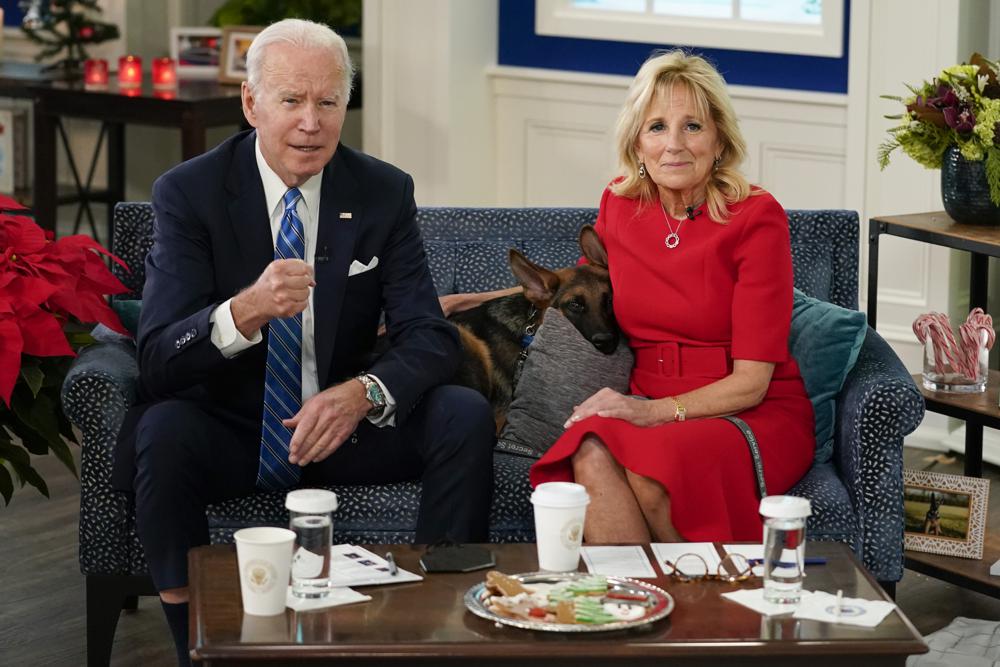
President Joe Biden marked his first Christmas in office by making calls to military service members stationed around the world, offering them holiday wishes and gratitude for their service and sacrifice for the nation. Joined by his wife, Jill, and their new puppy, Commander, the president on Saturday spoke via video to service members representing the Army, Marine Corps, Navy, Air Force, Space Force, and Coast Guard, stationed at bases in Qatar, Romania, Bahrain, and the U.S. “As your commander in chief, I wanted to take this opportunity to say thank you, thank you, thank you,” he told the service members. “We’re grateful for your courage, your sacrifice, not only your sacrifice but your family’s sacrifice.” Speaking from a studio set up at the White House, Biden told them they’re “the solid steel spine of the nation,” and emphasized the “truly sacred obligation” the nation has to care for soldiers and their families. Jill Biden expressed empathy for the difficulties their families experience spending the holidays away from their loved ones, noting that the Bidens experienced the same when their son Beau, who served as a major in the Delaware Army National Guard, was deployed to Iraq. The Bidens planned a relatively quiet Christmas at the White House with family. On Friday night, the president and the first lady participated in Holy Trinity’s Christmas Eve Mass virtually in the East Room, according to the White House, and held a pasta dinner and sleepover with their children and grandchildren, a Biden family tradition. As the coronavirus pandemic surges anew, driven by the highly infectious omicron variant, the Bidens sought with their public appearances and statements to offer a sense of unity and normalcy in an otherwise challenging season for many. In a Christmas statement, the Bidens praised the “enormous courage, character, resilience, and resolve” of the American people in the face of the pandemic and offered prayers that the nation would find “light in the darkness” during a difficult season. “During this season of joy, we are inspired by the countless Americans who are a reminder that the things we hold sacred unite us and transcend distance, time, and even the constraints of a pandemic,” the Bidens said in their statement. And the call to soldiers was just the latest Christmas tradition the two participated in after spending Christmas eve spreading holiday cheer around Washington. On Friday morning, they visited Children’s National Hospital to offer holiday greetings to young patients and their families. The president showed off photos of their new puppy, and Jill read a children’s book to patients. Later, the two stopped by a Jill Biden-themed Christmas tree in the Dupont Circle neighborhood. The president hung the 2021 White House Christmas ornament amid branches decked out with photos of his wife’s face, apples, and small chalkboards, in homage to her teaching career. Both answered calls to the North American Aerospace Defense Command’s Santa-tracking service, speaking to parents and children about their Christmas wishlists. Republished with the permission of the Associated Press.
White House holiday decor honors COVID-19 frontline workers
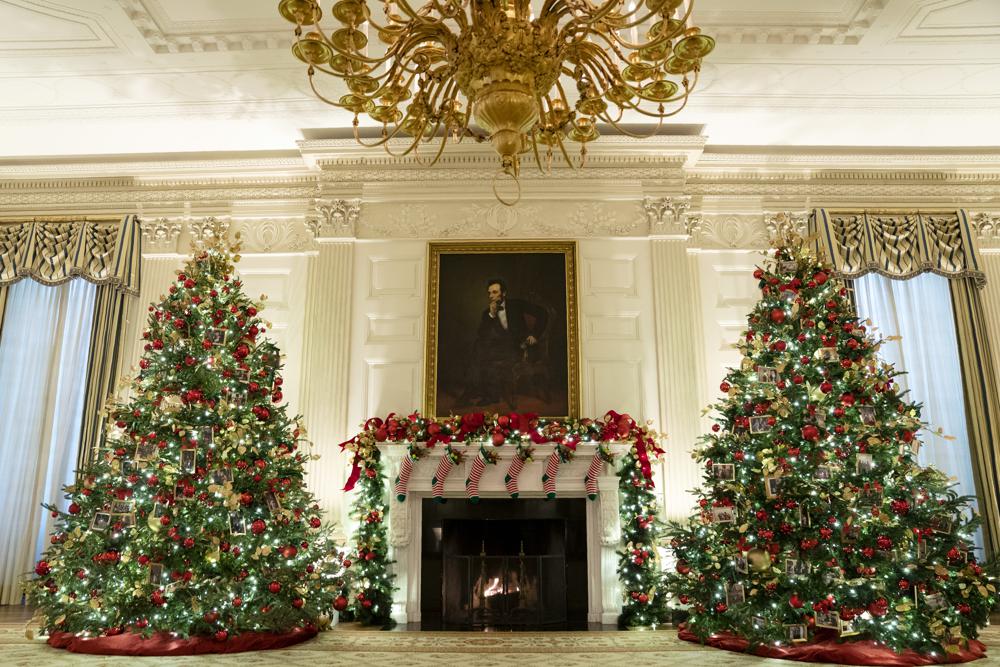
Holiday decorations unveiled Monday for Joe and Jill Biden’s first White House Christmas honor frontline workers who persevered during the COVID-19 pandemic. Nurses, doctors, teachers, grocery store workers, and others are recognized in this year’s gigantic Gingerbread White House, which was made into a 350-pound (158.76 kilograms) gingerbread village with the addition of a school and police, fire and gas stations as well as a hospital, a post office, a grocery store, and a warehouse to honor workers who stayed on the job. Fewer people are likely to see the decked-out mansion in person this year, with public tours still suspended because of the continuing threat from COVID-19. But videos, photos, and other details are available at WhiteHouse.gov/Holidays. “Gifts from the Heart” is the theme. In remarks thanking volunteers for decorating, the first lady explained the vision behind her theme, speaking of unity and her view that everyone comes together around faith, family and friendship, gratitude and service, and love for one’s community. “For all of our differences, we are united by what really matters,” she said. “Like points on a star, we come together at the heart. That is what I wanted to reflect in our White House this year. In each room, we tell a story of gifts from the heart.” The first lady, a longtime community college professor, invited Maryland second graders for Monday’s unveiling of the holiday decorations. They were inspired by people the president and first lady met while traveling around the country this year, according to the White House. Frontline workers are also represented in the iridescent doves and shooting stars that illuminate the East Colonnade hallway, “representing the peace and light brought to us by all the front-line workers and first responders during the pandemic,” the guidebook says. The COVID-19 pandemic has affected the White House holiday season in other ways, though it remained unclear how parties and receptions may be tweaked to compensate for it. White House press secretary Jen Psaki has said parties will be held, though they will be “different” from years past. Some indication will come Wednesday when the president and first lady and Vice President Kamala Harris and her husband, Doug Emhoff, light a menorah to celebrate Hanukkah. Emhoff, who is Jewish, helped light the National Menorah on the Ellipse on Sunday. Volunteers who decorated the White House came only from the surrounding area, instead of from all over the United States as in past years, because of COVID-19 concerns. The White House also wasn’t spared the supply shortages that many Americans are contending with. Some topiary trees took a little longer to arrive, said social secretary Carlos Elizondo. The other showstopper of holidays at the White House is the official Christmas tree, an 18-foot-tall (5.5-meter tall) Fraser fir that commands the Blue Room and is trimmed with white doves and ribbon bearing the names of all U.S. states and territories to celebrate peace and unity. More than 100 volunteers decorated the White House, including the Oval Office, while the Bidens spent Thanksgiving week in Nantucket, Massachusetts. They trimmed 41 Christmas trees and hung some 6,000 feet (2,000 yards) of ribbon and more than 10,000 ornaments. Twenty-five wreaths adorn the exterior of the White House, and nearly 79,000 lights illuminate the Christmas trees, garlands, wreaths, and other holiday displays. Christmas stockings for each of the Biden grandchildren — Naomi, Finnegan, Maisy, Natalie, Hunter, and baby Beau — hang from the fireplace mantel in the State Dining Room, which celebrates family, while two trees in that stately room are decorated with framed Biden family photos and photos of other first families during the holiday season. Many of the photos are personal favorites of Jill Biden, who picked them out of old family albums on trips home to Delaware, said Elizabeth Alexander, the first lady’s communications director. The decorations are the product of months of work by the first lady and her staff in the White House East Wing, starting as far back as June. A second grade class from Malcolm Elementary School in Waldorf, Maryland, was invited to the White House and bantered with PBS KIDS characters Martin and Chris Kratt from “Wild Kratts” and costumed characters Ms. Elaina, Daniel Tiger, Molly of Denali, Arthur, and Rosita from “Sesame Street.” The first lady then read her children’s book, “Don’t Forget, God Bless Our Troops.” “Let’s move on to happier things,” she said after stopping to ask the kids about their pets and one boy started talking about his dogs that had died. She invited a local National Guard family whose daughter was among the second graders to highlight the role the Guard has played in the U.S. response to COVID-19, and military families spending the holidays away from loved ones. Republished with the permission of the Associated Press.
Democrats, White House forge new North American trade deal
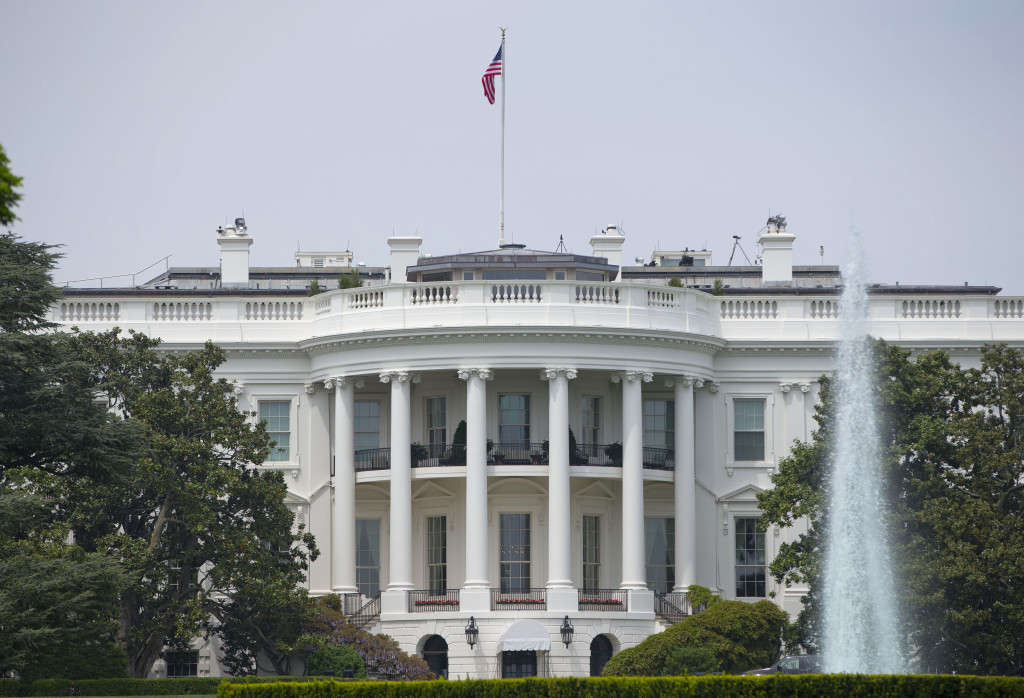
House Democrats and the White House announced a deal on a modified North American trade pact, handing President Donald Trump a major Capitol Hill win Tuesday on the same day that impeachment charges were announced against him. Both sides hailed the deal as a win for American workers. They said the revamped U.S.-Mexico-Canada Agreement was a significant improvement over the original North American Free Trade Agreement, with Democrats crowing about winning stronger provisions on enforcing the agreement while Republicans said it will help keep the economy humming along. “There is no question of course that this trade agreement is much better than NAFTA,” House Speaker Nancy Pelosi, Democrat-California, said in announcing the agreement, saying the pact is “infinitely better than what was initially proposed by the administration.” Trump said the revamped trade pact will “be great” for the United States. “It will be the best and most important trade deal ever made by the USA. Good for everybody – Farmers, Manufacturers, Energy, Unions – tremendous support. Importantly, we will finally end our Country’s worst Trade Deal, NAFTA!,” the president said in a tweet. The deal announcement came on the same morning that Democrats outlined impeachment charges against Trump. The trade pact is Trump’s top Capitol Hill priority along with funding for his long-sought border fence. In Mexico City, President Donald Trump’s son-in-law and senior adviser, Jared Kushner, U.S. Trade Representative Robert Lighthizer and Canadian Deputy Prime Minister Chrystia Freeland joined Mexican officials to sign the updated version of the United States-Mexico-Canada trade agreement, or USMCA, at a ceremony in Mexico City’s centuries-old National Palace. Mexican Foreign Minister Marcelo Ebrard congratulated the negotiators for reaching a second set of agreements to answer U.S. concerns about labor rights in Mexico, and regional content. “Mission accomplished!” Ebrard told the gathered officials. Lighthizer praised the joint work of the Trump administration, Democrats, business and labor leaders to reach an agreement, calling it “nothing short of a miracle that we have all come together.” “This is a win-win-win agreement which will provide stability for working people in all three countries for years to come,” Freeland said. “That is no small thing.” A U.S. House vote is likely before Congress adjourns for the year and the Senate is likely to vote in January or February. Pelosi was the key congressional force behind the deal, which updates the 25-year-old NAFTA accord that many Democrats — especially from manufacturing areas hit hard by trade-related job losses — have long lambasted. She and Ways and Means Committee Committee Chairman Richard Neal, Democrat-Massachusetts, forged a positive working relationship with Lighthizer, whom they credited with working in good faith. “Thanks to President Trump’s leadership, we have reached an historic agreement on the USMCA. After working with Republicans, Democrats, and many other stakeholders for the past two years we have created a deal that will benefit American workers, farmers, and ranchers for years to come,” Lighthizer said. “This will be the model for American trade deals going forward.” NAFTA eliminated most tariffs and other trade barriers involving the United States, Mexico and Canada. Critics, including Trump, labor unions and many Democratic lawmakers, branded the pact a job killer for the United States because it encouraged factories to move south of the border, capitalize on low-wage Mexican workers and ship products back to the U.S. duty free. Weeks of back-and-forth, closely monitored by Democratic labor allies such as the AFL-CIO, have brought the two sides together. Pelosi is a longtime free trade advocate and supported the original NAFTA in 1994. Trump has accused Pelosi of being incapable of passing the agreement because she is too wrapped up in impeachment. The original NAFTA badly divided Democrats but the new pact is more protectionist and labor-friendly, and Pelosi is confident it won’t divide the party, though some liberal activists took to social media to carp at the agreement. “There is no denying that the trade rules in America will now be fairer because of our hard work and perseverance. Working people have created a new standard for future trade negotiations,”said AFL-CIO President Richard Trumka. “President Trump may have opened this deal. But working people closed it.” Business groups like the U.S. Chamber of Commerce also chimed in to support the long-delayed agreement. “We are optimistic this development will open the door to final approval of USMCA on a bipartisan basis by the end of the year, which will especially benefit American farmers, manufacturers, and small businesses,” Thomas Donohue, CEO of the U.S. Chamber of Commerce, said in a statement. “This agreement has been the result of painstaking bipartisan negotiations over the past year, and would not have been possible if not for the willingness of President Trump to work patiently with Democrats to get something done that he knew was in the best interests of American workers, farmers and manufacturers,” said Sen. Rob Portman, Republican-Ohio, a former U.S. trade representative. Republicans leaders and lawmakers have agitated for months for the accord but Pelosi has painstakingly worked to bring labor on board. Democrats see the pact as significantly better than NAFTA and Trumka’s endorsement is likely to add to a strong vote by Democrats that have proven skeptical of trade agreements. “I think the vote’s going to be pretty good,” said No. 2 House Democrat Steny Hoyer, D-Md., a veteran party whip. “There’s a general agreement — not total agreement, it’s not unanimity — that USMCA is better. It’s an improvement. And to the extent that Trumka and labor comes out and says that this is an improvement, I think that that will be unifying.” The pact contains provisions designed to nudge manufacturing back to the United States. For example, it requires that 40 percent to 45 percent of cars eventually be made in countries that pay autoworkers at least $16 an hour — that is, in the United States and Canada and not in Mexico. The trade pact picked up some momentum after Mexico in April passed a labor-law overhaul required by USMCA. The reforms are meant
Judiciary hearing sets stage for Donald Trump impeachment charges
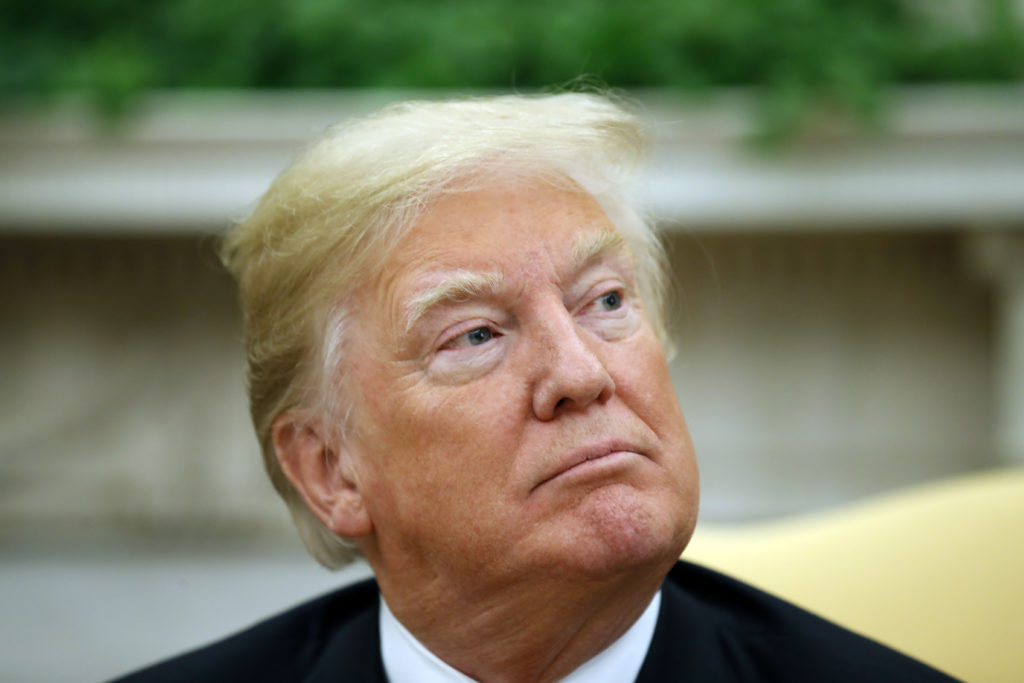
Pushing ahead with articles of impeachment, the House Judiciary Committee convenes Monday to formally receive the investigative findings against President Donald Trump as the White House and its allies launch an aggressive attack on Democrats and the proceedings. Chairman Jerrold Nadler expects the committee to vote soon, possibly this week, on at least two or more charges against the Republican president. Democrats say Trump’s push to have Ukraine investigate rival Joe Biden while at the same time withholding U.S. military aid ran counter to U.S. policy and benefited Russia. It could result in impeachment charges of abuse of power, bribery and obstruction. “The central allegation is that the president put himself above his country several times, that he sought foreign interference in our elections several times, both for 2016 and 2020, that he sought to cover it up,” Nadler said. “All this presents a pattern that poses a real and present danger to the integrity of the next election, which is one reason why we can’t just wait for the next election to settle matters,” he said. In advance of the hearing, Nadler sent a letter to the White House late Sunday officially forwarding the House Intelligence committee’s report, along with additional evidence supporting impeachment. It also invites White House officials to review sensitive materials in a classified setting. The hearing sets off a pivotal week as Democrats march toward a full House vote expected by Christmas. In drafting the articles of impeachment, Speaker Nancy Pelosi is facing a legal and political challenge of balancing the views of her majority while hitting the constitution’s bar of “treason, bribery or other high crimes and misdemeanors.” Trump and his allies acknowledge he likely will be impeached in the Democratic-controlled House, but they also expect acquittal next year in the Senate, where Republicans have the majority. Trump’s team is turning attention elsewhere, including Monday’s release of a long-awaited Justice Department report into the 2016 Russia investigation. “Impeachment Hearing Hoax,” Trump tweeted Sunday. The White House is refusing to participate in the process it calls a sham and the top Republican on the panel, Rep. Doug Collins of Georgia asked to postpone the hearing, criticizing Democrats for moving too swiftly. One legal scholar testified last week it would be the quickest impeachment in modern history. “This is just how desperately they are — desperately focused on impeaching this president,” said Collins who said against Democrats unleashed thousands of pages of documents his side has no time to review before the session. ”This is a show. This is a farce. This is whatever you want to call it. The American people are having their tax dollars wasted on this impeachment of this president.” Trump is heading out for campaign rallies shifting attention away from the House. Over the weekend, Trump was focused on a related matter, the Justice Department Inspector General’s findings into the FBI’s decisions to investigate Russian interference in the 2016 election. The president has long called special counsel Robert Mueller’s Russia probe a “witch hunt,” but the Inspector General’s report is expected to reject the president’s claim that it was illegitimate, according to people familiar with its findings. Trump tweeted Sunday, “I.G. report out tomorrow. That will be the big story!” Democrats say Trump abused his power in the July 25 phone call when he asked Ukrainian President Volodymyr Zelenskiy for a favor in investigating Democrats and engaged in bribery by withholding nearly $400 million in military aide that Ukraine depends on to counter Russian aggression. Trump and his aides have made clear that they now see his impeachment in the House as inevitable and have shifted their focus. A vote to convict requires a two-thirds vote of the Senate, where Republicans hold 53 of 100 seats. It is unlikely that any Republican senators would cross party lines and vote to remove Trump from office. As Democrats draft the articles, Pelosi’s challenge will be to go broad enough to appease her liberal flank, which prefers a more robust accounting of Trump’s actions reaching back to Mueller’s findings, while keeping the charges more tailored to Ukraine as centrist lawmakers prefer. Democratic leaders will meet later Monday evening. Rep. Adam Schiff, Democrats-California, the chairman of the Intelligence Committee, said Democrats should approach the question of what to include in the articles the way a prosecutor bringing forward “‘the strongest and most overwhelming evidence and not try to charge everything, even though you could charge other things.” Schiff said, “I think we should focus on those issues that provide the greatest threat to the country. And the president is engaged in a course of conduct that threatens the integrity of the next election, threatens our national security.” Monday’s hearing is to receive the Intelligence panel’s report on the inquiry, with lawyers from both parties testifying in what is expected to be a day long session that will lay the groundwork for the impeachment charges. Nadler, in two television interviews, declined to say ultimately how many articles of impeachment Democrats will present but said they will involve “certainly abuse of power” and likely “obstruction of Congress.” He said final decisions will come after Monday’s hearing following discussions with House leadership and the Democratic caucus. Nadler pointed to a “pattern” of conduct by Trump in seeking foreign interference in elections but would not commit to including the evidence of obstruction of justice in special counsel Robert Mueller’s Russia investigation as part of the articles of impeachment. In his report, Mueller said he could not determine that Trump’s campaign conspired or coordinated with Russia in the 2016 election. But Mueller said he could not exonerate Trump of obstructing justice in the probe and left it for Congress to determine. House Republican leader Kevin McCarthy criticized Democrats for their timeline, which he said was unfairly aimed at preventing the nation’s voters from making their own choices in the 2020 election. “If they do not impeach him, they cannot beat him at the polls,” McCarthy, Republican-California. Trump said over the weekend that his personal attorney Rudy Giuliani wants to take the information gathered from Giuliani’s investigations and
Kamala Harris ends campaign for presidential bid, citing lack of funding
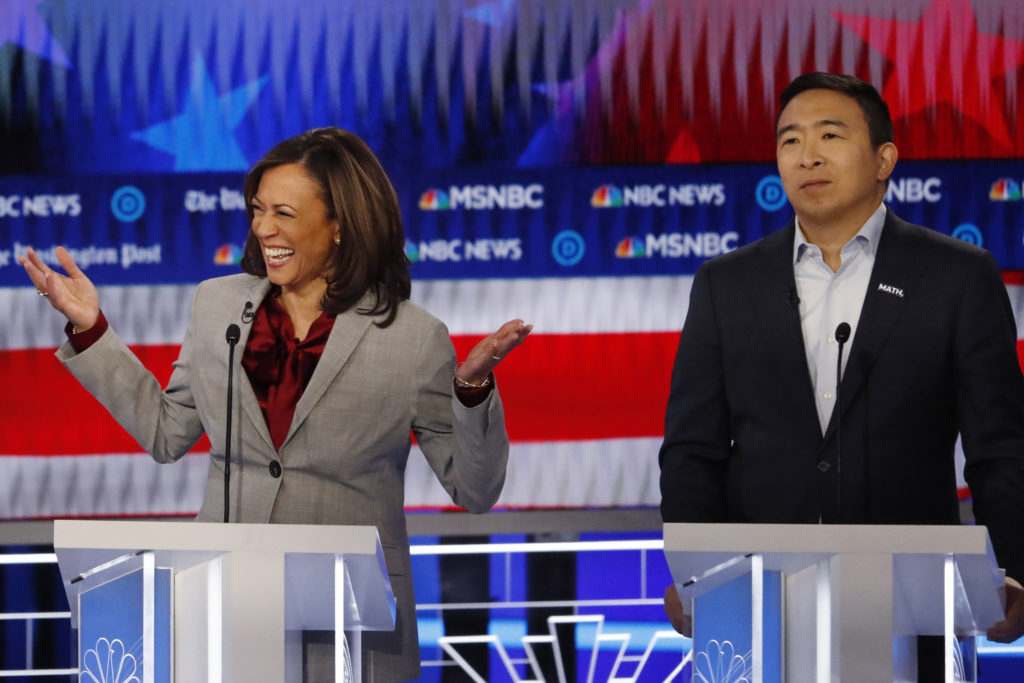
Sen. Kamala Harris told supporters on Tuesday that she was ending her bid for the 2020 Democratic presidential nomination, an abrupt close to a candidacy that held historic potential. “I’ve taken stock and looked at this from every angle, and over the last few days have come to one of the hardest decisions of my life,” the California Democrat said. “My campaign for president simply doesn’t have the financial resources we need to continue.” A senior campaign aide said Harris made the decision Monday after discussing the path forward with family and other top officials over the Thanksgiving holiday. Her withdrawal marked a dramatic fall for a candidate who showed extraordinary promise in her bid to become the first black female president. Harris launched her campaign in front of 20,000 people on a chilly January day in Oakland, California. The first woman and first black attorney general and U.S. senator in California’s history, she was widely viewed as a candidate poised to excite the multiracial coalition of voters that sent Barack Obama to the White House. Her departure erodes the diversity of the Democratic field, which is dominated at the moment by a top tier that is white and mostly male. “She was an important voice in the race, out before others who raised less and were less electable. It’s a loss not to have her voice in the race,” said Aimee Allison, who leads She the People, a group that promotes women of color. Harris ultimately could not craft a message that resonated with voters or secure the money to continue her run. She raised an impressive $12 million in the first three months of her campaign and quickly locked down major endorsements meant to show her dominance in her home state, which offers the biggest delegate haul in the Democratic primary contest. But as the field grew, Harris’ fundraising remained flat; she was unable to attract the type of attention being showered on Pete Buttigieg by traditional donors or the grassroots firepower that drove tens of millions of dollars to Elizabeth Warren and Bernie Sanders. In her note to supporters, Harris lamented the role of money in politics and, without naming them, took a shot at billionaires Tom Steyer and Michael Bloomberg, who are funding their own presidential bids. “I’m not a billionaire,” she said. “I can’t fund my own campaign. And as the campaign has gone on, it’s become harder and harder to raise the money we need to compete.” Harris suffered from what allies and critics viewed as an inconsistent pitch to voters. Her slogan “For the people” referenced her career as a prosecutor, a record that was viewed skeptically by the party’s most progressive voters. Through the summer, she focused on pocketbook issues and her “3 a.m. agenda,” a message that never seemed to resonate with voters. By the fall, she had returned to her courtroom roots with the refrain that “justice is on the ballot,” both a cry for economic and social justice as well as her call that she could “prosecute the case” against a “criminal” president. At times, she was tripped up by confusing policy positions; particularly on health care. After suggesting she would eliminate private insurance in favor of a fully government-run system, Harris eventually rolled out a health care plan that preserves a role for private insurance. Stumbles, often of the campaign’s making, continued to dog Harris into the winter, stymieing her ability to capitalize on solid moments. Harris kicked off November with a well-received speech at a massive Iowa dinner, just a day after her campaign announced it would fire staff at its Baltimore headquarters and was moving some people from other early states to Iowa. Her message was regularly overshadowed by campaign aides and allies sharing grievances with the news media. Several top aides decamped for other campaigns, one leaving a blistering resignation letter. “Because we have refused to confront our mistakes, foster an environment of critical thinking and honest feedback, or trust the expertise of talented staff, we find ourselves making the same unforced errors over and over,” Kelly Mehlenbacher wrote in her letter, obtained by The New York Times. Mehlenbacher now works for businessman Bloomberg’s campaign. With Harris’ exit, 15 Democrats remain in the race for the nomination. Several praised her on Tuesday. Former Vice President Joe Biden, who had a memorable debate stage tussle with Harris this summer, called the senator a “solid person, loaded with talent.” Vermont Sen. Bernie Sanders commended Harris for “running a spirited and issue-oriented campaign.” New Jersey Sen. Cory Booker, one of two black candidates still in the campaign, called Harris a “trailblazer.” Harris anchored her campaign in the powerful legacy of pioneering African Americans. Her campaign launch on the Martin Luther King Jr. holiday included a nod to Shirley Chisholm, the New York congresswoman who sought the Democratic Party’s presidential nomination 47 years ago earlier. One of her first stops as a candidate was to Howard University, the historically black college that she attended as an undergraduate. She spent much of her early campaign focusing on South Carolina, which hosts the first Southern primary and has a significant African American population. But Harris struggled to chip away at Biden’s deep advantage with black voters who are critical to winning the Democratic nomination. Harris and her aides believe she faced an uphill battle — and unfair expectations for perfection — from the start as a woman of color. Her campaign speech included a line about what Harris called the “donkey in the room,” a reference to the thought that Americans wouldn’t elect a woman of color. Harris often suggested it was criticism she faced in her other campaigns — all of which she won. Her departure from the presidential race marks her first defeat as a political candidate. Associated Press writers Steve Peoples in New York and Bill Barrow in Mason City, Iowa, contributed to this report. By Kathleen Ronayne and Nicholas Riccardi Associated Press. Republished with the Permission of the Associated Press.
White House officials to kick off big Donald Trump impeachment week
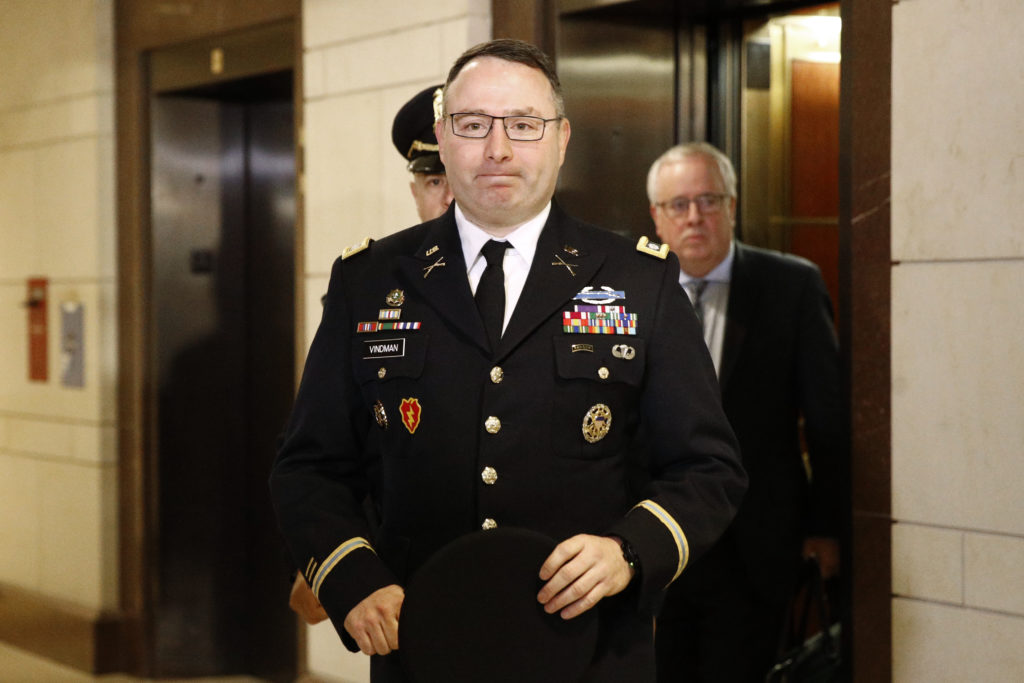
Two top national security aides who listened to President Donald Trump’s July call with Ukraine’s president are preparing to testify Tuesday at House impeachment hearings as the inquiry reaches deeper into the White House. Lt. Col. Alexander Vindman, an Army officer at the National Security Council, and Jennifer Williams, his counterpart at Vice President Mike Pence’s office, say they had concerns as Trump spoke on July 25 with the newly elected Ukraine president about political investigations into Joe Biden. After they appear Tuesday morning, the House will hear in the afternoon from former NSC official Timothy Morrison and Kurt Volker, the former Ukraine special envoy. In all, nine current and former U.S. officials are testifying as the House’s impeachment inquiry accelerates. Democrats say Trump’s pressure on Ukraine to investigate his Democratic rivals as he withheld U.S. military aid Ukraine needed to resist Russian aggression may be grounds for removing the 45th president. Trump says he did no such thing and the Democrats just want him gone. Vindman and the other witnesses have testified in earlier, closed-door sessions. Their depositions have been publicly released, and they’ll face direction questions from lawmakers on Tuesday. “I did not think it was proper to demand that a foreign government investigate a U.S. citizen,” said Vindman, a decorated Iraq War veteran. He said there was “no doubt” what Trump wanted from Ukrainian President Volodymyr Zelenskiy. It wasn’t the first time Vindman, a 20-year military officer, was alarmed over the administration’s push to have Ukraine investigate Democrats, he testified. Earlier, during an unsettling July 10 meeting at the White House, Ambassador Gordon Sondland told visiting Ukraine officials that they would need to “deliver” before next steps, which was a meeting Zelenskiy wanted with Trump, the officer testified. “He was talking about the 2016 elections and an investigation into the Bidens and Burisma,” Vindman testified, referring to the gas company in Ukraine where Hunter Biden served on the board. “The Ukrainians would have to deliver an investigation into the Bidens,” he said. “There was no ambiguity.” On both occasions, Vindman said, he took his concerns about the shifting Ukraine policy to the lead counsel at the NSC, John Eisenberg. Williams, a longtime State Department official who is detailed to Pence’s national security team, said she too had concerns during the phone call, which the aides monitored as is standard practice. When the White House produced a rough transcript later that day, she put it in the vice president’s briefing materials. “I just don’t know if he read it,” Williams testified in a closed-door House interview. Pence’s role throughout the impeachment inquiry has been unclear, and the vice president’s aide is sure to be questioned by lawmakers looking for answers. Trump has already attacked Williams, associating her with “Never Trumpers,” even though there is no indication the career State Department official has shown any partisanship. The president wants to see a robust defense by his GOP allies on Capitol Hill, but so far so far Republicans have offered a changing strategy as the fast-moving probe spills into public view. They’re expected to mount a more aggressive attack on the witnesses as they try to protect Trump. In particular, Republicans are expected to try to undercut Vindman, suggesting he reported his concerns outside his chain of command, which would have been Morrison, not the NSC lawyer. Under earlier questioning, Republicans wanted Vindman to disclose who else he may have spoken to about his concerns, as the GOP inch closer to publicly naming the still anonymous whistleblower whose report sparked the inquiry. GOP Sen. Ron Johnson, who was deeply involved in other White House meetings about Ukraine, offered a sneak preview of this strategy late Monday when he compared Vindman, a Purple Heart veteran, to the “bureaucrats” who “never accepted Trump as legitimate.” “They react by leaking to the press and participating in the ongoing effort to sabotage his policies and, if possible, remove him from office.” It is entirely possible that Vindman fits this profile, said Johnson, Republican-Wisconsin. The White House has instructed officials not to appear, and most have received congressional subpoenas to compel their testimony. The witnesses are testifying under penalty of perjury, and Sondland already has had to amend his earlier account amid contradicting testimony from other current and former U.S. officials. Sondland, the wealthy donor whose routine boasting about his proximity to Trump has brought the investigation to the president’s doorstep, is set to testify Wednesday. Others have testified that he was part of a shadow diplomatic effort with the president’s personal lawyer, Rudy Giuliani, outside of official channels that raised alarms. Morrison has referred to Burisma as a “bucket of issues” — the Bidens, Democrats, investigations — he had tried to “stay away” from. Sondland met with a Zelenskiy aide on the sidelines of a Sept. 1 gathering in Warsaw, and Morrison, who was watching the encounter from across the room, testified that the ambassador told him moments later he pushed the Ukrainian for the Burisma investigation as a way for Ukraine to gain access to the military funds. Volker provided investigators with a package of text messages with Sondland and another diplomat, William Taylor, the charge d’affaires in Ukraine, who grew alarmed at the linkage of the investigations to the aid. Taylor, who testified publicly last week, called that “crazy.” A wealthy hotelier who donated $1 million to Trump’s inauguration, Sondland is the only person interviewed to date who had direct conversations with the president about the Ukraine situation. Morrison said Sondland and Trump had spoken about five times between July 15 and Sept. 11 — the weeks that $391 million in U.S. assistance was withheld from Ukraine before it was released. Trump has said he barely knows Sondland. The committee will also hear on Wednesday from Laura Cooper, a deputy assistant secretary of defense, and David Hale, a State Department official. On Thursday, David Holmes, a State Department official in Kyiv, and Fiona Hill, a former top NSC staff member for Europe and Russia, will
The Latest: Representative Devin Nunes reads White House memo at start of hearing
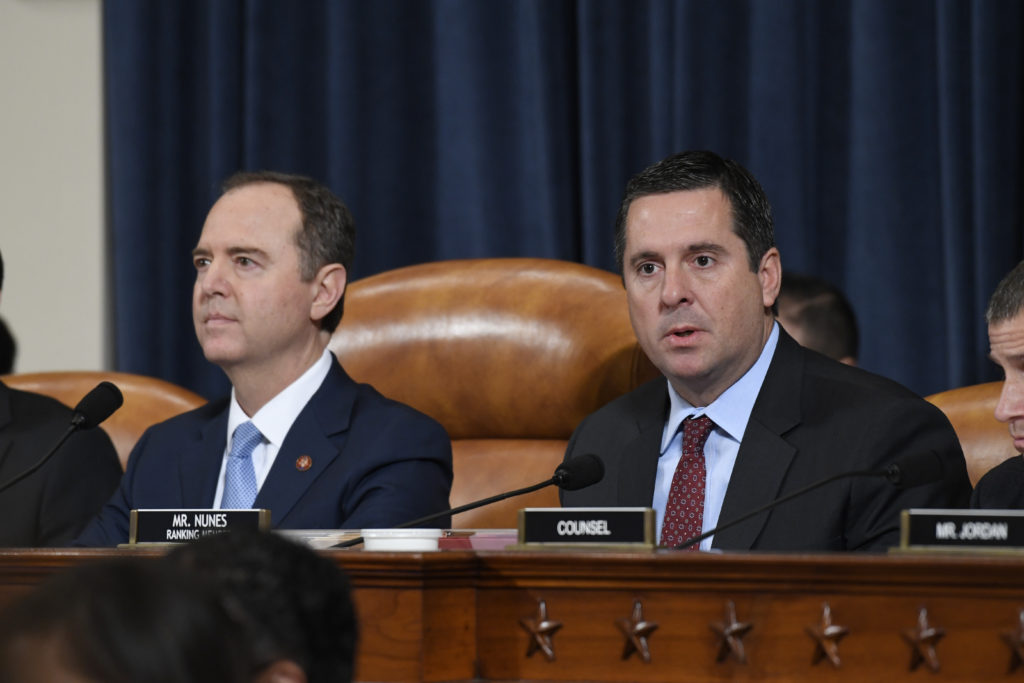
The Latest on President Donald Trump and House impeachment hearings (all times local): 9:35 a.m. The top Republican on the House Intelligence Committee has read aloud a memo circulated by the White House that summarizes the first conversation between President Donald Trump and his newly elected Ukrainian counterpart. The first conversation took place in April after the election of Volodymyr Zelenskiy. It consists largely of pleasantries and words of congratulations. The White House made a record of the conversation public at the start of the House impeachment hearing on Friday. Rep. Devin Nunes, the top Republican on the House Intelligence Committee, read the document aloud to suggest that there was nothing untoward in the conversation. Rep. Adam Schiff, the committee chairman, said Trump should also “release the thousands of other records that he has instructed the State Department not to release.” ___ 9:30 a.m. House Intelligence Committee Chairman Adam Schiff says former Ambassador to Ukraine Marie Yovanovitch was “smeared and cast aside” by President Donald Trump because she was considered an obstacle to his personal and political agenda. Opening the second public House impeachment hearing, Schiff said the question isn’t whether Trump could recall Yovanovitch but “why would he want to?” Yovanovitch testified behind closed doors last month that she was told to “watch her back” before she was ousted in May as Trump lawyer Rudy Giuliani led a shadow foreign policy. Schiff said pushback at the State Department failed when it became clear that Trump wanted her gone. Republican Rep. Devin Nunes said the hearings were “spectacles” for Democrats to “advance their operation to topple a duly elected president.” ___ 9 a.m. The House has opened a second day of Trump impeachment hearings with Marie Yovanovitch, the former U.S. ambassador to Ukraine who was suddenly recalled back to the U.S. by President Donald Trump. Yovanovitch is expected to testify about her ouster, which another diplomat has called a “smear” campaign against her by Trump allies. The live public hearings by the House Intelligence Committee are being held to determine whether Trump should be removed from office over his actions toward Ukraine. The investigation centers on Trump’s July 25 phone call when he asked the new Ukraine president for a favor — to investigate Democrats and potential 2020 rival Joe Biden — as the White House was withholding military aid to the Eastern European nation. Yovanovitch and others have described Rudy Giuliani, Trump’s personal lawyer, as leading what one called an “irregular channel” outside the diplomatic mainstream of U.S.-Ukraine relations. __ 8:35 a.m. The former U.S. Ambassador to Ukraine has arrived on Capitol Hill to testify in the Trump impeachment inquiry. Marie Yovanovitch is the witness for the second day of public hearings. She’s expected to tell lawmakers about her sudden ouster as President Donald Trump recalled the career ambassador back to the United States. Other diplomats testifying in the investigation have defended Yovanovitch, saying she was the target of “smear” campaign by the president’s allies. She has served both Democratic and Republican presidents. The rare impeachment inquiry is focused on Trump’s actions toward Ukraine. Democrats say it amounts to bribery, as the president withheld military aid to Ukraine while he pushed the country to investigate rival Democrats, including Joe Biden. Trump calls the probe a hoax and says he did nothing wrong. __ 12:15 a.m. The House will hear from a singular witness Friday in the Trump impeachment hearings: Marie Yovanovitch, the former U.S. ambassador to Ukraine who was targeted by the president’s allies in a “smear” campaign now central to the probe. The career diplomat, who served both Republican and Democratic presidents, is expected to relay her striking story of being suddenly recalled by Donald Trump and told to “watch my back.” It was all part of a swiftly developing series of events that sounded alarms about the White House’s shadow foreign policy. Friday is the second day of public hearings to consider removing America’s 45th president. Democrats and Republicans are hardening their messages to voters as they try to sway voter opinion amid a deeply polarized public. The House will hear from a singular witness Friday in the Trump impeachment hearings: Marie Yovanovitch, the former U.S. ambassador to Ukraine who was targeted by the president’s allies in a “smear” campaign now central to the inquiry. Republished with the permission of the Associated Press.
Donald Trump honors World Series champion Nationals at White House
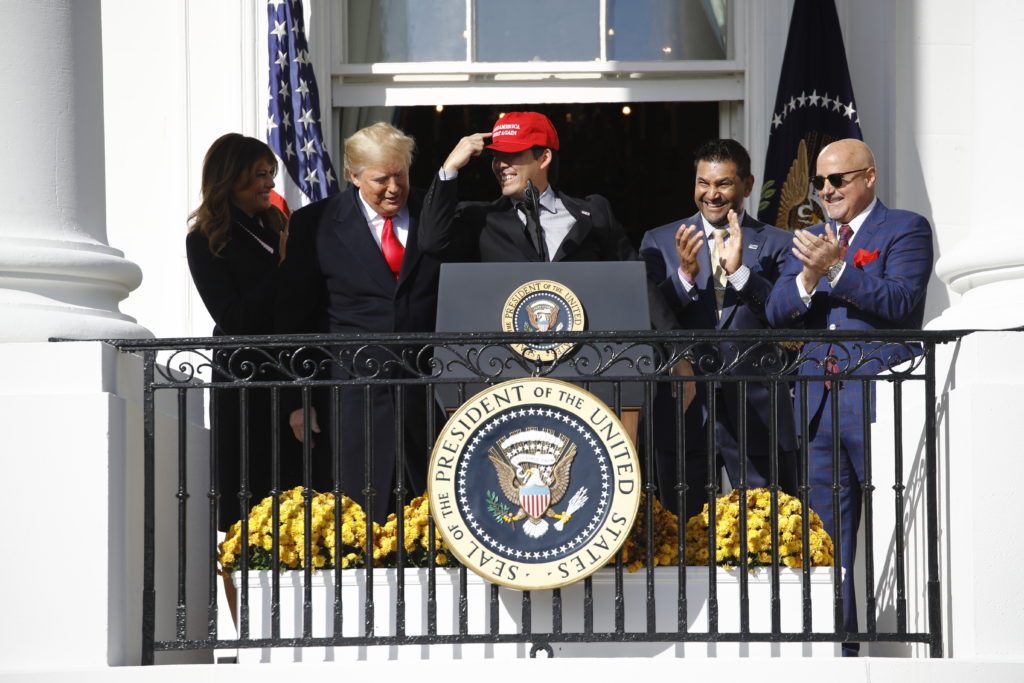
President Donald Trump mostly stuck to sports Monday while honoring the World Series champion Washington Nationals, who had a handful of players skip the White House visit. Amid an impeachment inquiry on Capitol Hill and Washington feting its first Major League Baseball champion since 1924, Trump hugged Kurt Suzuki after the catcher put on a “Make America Great Again” hat. Trump received a No. 45 Nationals jersey from first baseman Ryan Zimmerman, applauding the team’s first title and calling it a “comeback story for the ages.” “Everyone fell in love with Nats baseball,” Trump said during the half-hour ceremony on the South Lawn attended by thousands of fans. “That’s all they wanted to talk about — that and impeachment. I like Nats baseball more.” Reliever Sean Doolittle, who along with his wife has worked with Syrian refugees and military veterans and supports gay rights, did not attend the event. Also among those not listed as attending were National League MVP finalist Anthony Rendon, outfielders Victor Robles and Michael A. Taylor, and pitchers Joe Ross, Javy Guerra and Wander Suero. Principal owner Mark Lerner was the only member of the ownership group listed as attending. Eighteen of the 25 players on Washington’s World Series roster decided to go, including World Series MVP Stephen Strasburg, who opted out of the final four years of his contract but could re-sign for a more lucrative deal. Fans chanted “Four more years! Four more years” at Strasburg. The Nationals on Monday tendered qualifying offers to Strasburg and Rendon, another free agent. Despite Suzuki trading in the Nationals’ curly “W” for Trump’s signature hat and Zimmerman thanking the president for keeping the country safe and continuing to make it the best on earth, the Nationals’ visit did not have as much political undertones as when the 2018 champion Boston Red Sox visited the White House. They did so without manager Alex Cora, who did not attend that ceremony after citing his frustration with the administration’s efforts to help his native Puerto Rico recover from a devastating hurricane. Washington manager Dave Martinez, whose parents are Puerto Rican, was in attendance and made some brief remarks to the delight of fans and players. Trump called it a record crowd, saying, “We’ve never had this many people on the front lawn of the White House.” The White House estimated an attendance of 5,300. The U.S. Marine Corps band played the team into the ceremony with “Baby Shark,” which became the Nationals’ unofficial theme song as they went from 17-31 in May to World Series champions. “It’s miraculous what we did,” NL Championship Series MVP Howie Kendrick said. “We brought a title back.” After Trump singled out Strasburg, Kendrick, pitcher Aníbal Sánchez and other playoff heroes, players exited with the World Series trophy to the strains of “We Are The Champions.” The Nationals’ White House visit was the latest stop on their whirlwind victory tour around the nation’s capital after coming back from a 3-2 series deficit to beat the Houston Astros in Game 7 last week. The team paraded down Constitution Avenue on Saturday and celebrated at the Washington Capitals hockey game Sunday night. More AP MLB: https://apnews.comMLB and https://twitter.com/AP_Sports By Stephen Whyno AP Sports Writer. Republished with the permission of the Associated Press.
What’s Next: Impeachment depositions turn to the White House
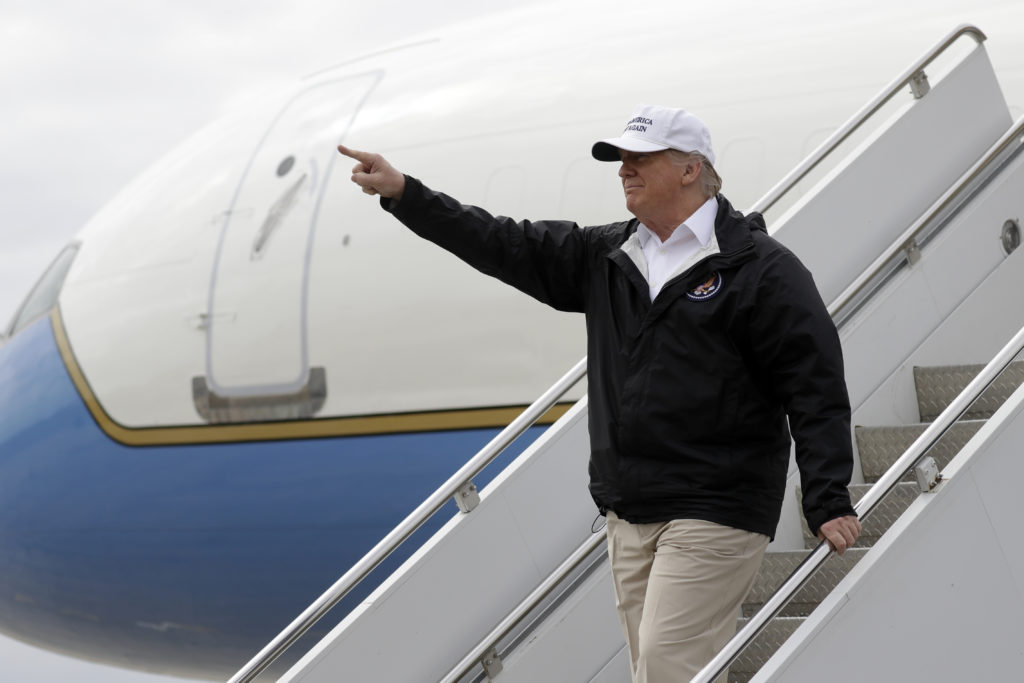
For only the fourth time in U.S. history, the House of Representatives has started a presidential impeachment inquiry. House committees are trying to determine if President Donald Trump violated his oath of office by asking Ukraine to investigate political rival Joe Biden and his family, and to investigate the country’s involvement in the 2016 U.S. presidential election. A quick summary of the latest news: DEPOSITIONS TURN TO WHITE HOUSE The three House committees leading the Democratic investigation have scheduled several current and former National Security Council officials to testify this week behind closed doors — an attempt to get a better look inside the White House as Trump pushed Ukraine to conduct politically motivated investigations. But it’s not clear whether the witnesses will appear as scheduled. A lawyer for Charles Kupperman, a former deputy at the NSC under then-national security adviser John Bolton, said Kupperman will comply if a court orders his appearance. He had been scheduled to testify Monday. Other witnesses summoned this week are current NSC staffers Tim Morrison and Alexander Vindman. Morrison is particularly significant. William Taylor, the top U.S. diplomat in Ukraine, told lawmakers in his deposition last week about phone calls he had with Morrison that described the Ukraine effort. The chairman of the House Intelligence Committee, Rep. Adam Schiff, who’s leading the inquiry, said Sunday he would like Bolton to testify but expects the White House would “fight us” over his appearance. Bolton is “a very important witness” who has “very relevant information,” Schiff, Democrat-California, told ABC’s “This Week.” The committees are scheduled to hear from three other State Department and Defense Department witnesses as well. Lawmakers want to determine whether military aid to Ukraine was held up as a condition of the investigations. The Democrats are moving quickly, sometimes scheduling multiple depositions in one day. They’re trying to compile facts and eventually transition to public hearings. Schiff said Saturday that the committees are making “rapid progress.” He told ABC that “we will be doing public hearings, and I think we’ll be doing them soon.” A WITNESS SUES It is unclear if all of the officials will appear because Trump has pledged to obstruct the probe. So far, most witnesses have decided to testify after receiving subpoenas from the committees. One of the witnesses, Kupperman, has taken the extraordinary step of asking a federal court who he should listen to — Congress or Trump. After he was subpoenaed, Kupperman filed a lawsuit in federal court on Friday asking a court whether he should accede to House demands for his testimony or to assert “immunity from congressional process” as directed by Trump. In the lawsuit, Kupperman said he “cannot satisfy the competing demands of both the legislative and executive branches.” Without the court’s help, he said, he would have to make the decision himself — one that could “inflict grave constitutional injury” on either Congress or the presidency. DEMOCRATIC COURT VICTORY A judge on Friday ordered the Justice Department to give the House secret grand jury testimony from special counsel Robert Mueller’s Russia investigation , handing a victory to Democrats who want the material for the impeachment inquiry. In ordering the department to turn over the material by Oct. 30, Chief U.S. District Judge Beryl Howell affirmed the legality of the impeachment inquiry itself. The Mueller materials could reveal previously hidden details to lawmakers about Trump’s actions during the 2016 election and become part of the impeachment push. The Trump administration could appeal the decision, however, further delaying the release of the materials. WORTH WATCHING The basics of the impeachment process are explained in less than two minutes in this AP-produced animated video: https://youtu.be/TSuLV_kDzeo Republished with the permission of the Associated Press.
White House and democrats fight over rules for impeachment
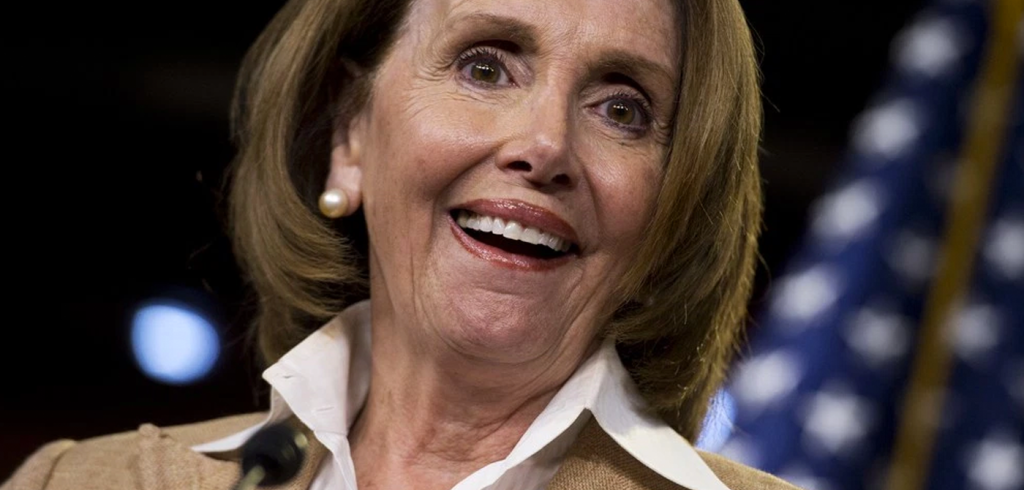
The U.S. Constitution gives the House “the sole power of impeachment” — but it confers that authority without an instruction manual. Now comes the battle royal over exactly what it means. In vowing to halt all cooperation with House Democrats’ impeachment inquiry, the White House on Tuesday labeled the investigation “illegitimate” based on its own reading of the Constitution’s vague language. In an eight-page letter, White House counsel Pat Cipollone pointed to House Speaker Nancy Pelosi’s failure to call for an official vote to proceed with the inquiry as grounds to claim the process a farce. “You have designed and implemented your inquiry in a manner that violates fundamental fairness and constitutionally mandated due process,” Cipollone wrote. But Douglas Letter, a lawyer for the House Judiciary Committee, told a federal judge Tuesday that it’s clear the House “sets its own rules” on how the impeachment process will play out. The White House document lacked much in the way of legal arguments, seemingly citing cable TV news appearances as often as case law. And legal experts cast doubt upon its effectiveness. “I think the goal of this letter is to further inflame the president’s supporters and attempt to delegitimize the process in the eyes of his supporters,” said Stephen Vladeck, a law professor at the University of Texas. Courts have been historically hesitant to step in as referee for congressional oversight and impeachment. In 1993, the Supreme Court held that impeachment was an issue for the Congress and not the courts. In that case, Walter Nixon, a federal district judge who was removed from office, sought to be reinstated and argued that the full Senate, instead of a committee that was established to hear testimony and collect evidence, should have heard the evidence against him. The court unanimously rejected the challenge, finding impeachment is a function of the legislature that the court had no authority over. As for the current challenge to impeachment, Vladeck said the White House letter “does not strike me as an effort to provide sober legal analysis.” Gregg Nunziata, a Philadelphia attorney who previously served as general counsel and policy adviser to Republican Sen. Marco Rubio, said the White House’s letter did not appear to be written in a “traditional good-faith back and forth between the legislative and executive branches.” He called it a “direct assault on the very legitimacy of Congress’ oversight power.” “The Founders very deliberately chose to put the impeachment power in a political branch rather the Supreme Court,” Nunziata told The Associated Press. “They wanted this to be a political process and it is.” G. Pearson Cross, a political science professor at the University of Louisiana at Lafayette, said the letter appeared to act as nothing more than an accelerant on a smoldering fire. “It’s a response that seems to welcome a constitutional crisis rather than defusing one or pointing toward some strategy that would deescalate the situation,” Cross said. After two weeks of a listless and unfocused response to the impeachment probe, the White House letter amounted to a declaration of war. It’s a strategy that risks further provoking Democrats in the impeachment probe, setting up court challenges and the potential for lawmakers to draw up an article of impeachment accusing President Donald Trump of obstructing their investigations. Democrats have said that if the White House does not provide the information, they could write an article of impeachment on obstruction of justice. It is unclear if Democrats would wade into a lengthy legal fight with the administration over documents and testimony or if they would just move straight to considering articles of impeachment. House Intelligence Committee Chairman Adam Schiff, Democrat – California, who is leading the Ukraine probe, has said Democrats will “have to decide whether to litigate, or how to litigate.” But they don’t want the fight to drag on for months, as he said the Trump administration seems to want to do. A federal judge heard arguments Tuesday on whether the House had undertaken a formal impeachment inquiry despite not having taken an official vote and whether it can be characterized, under the law, as a “judicial proceeding.” The distinction matters because while grand jury testimony is ordinarily secret, one exception authorizes a judge to disclose it in connection with a judicial proceeding. House Democrats are seeking grand jury testimony from special counsel Robert Mueller’s Russia investigation as they conduct the impeachment inquiry. By Jonathan Lemire, Jim Mustian and Mike Balsamo Associated Press Mustian reported from New York. Associated Press writer Eric Tucker contributed to this report. Republished with the permission of the Associated Press.
White House insists fundamentals of U.S. economy ‘very strong’
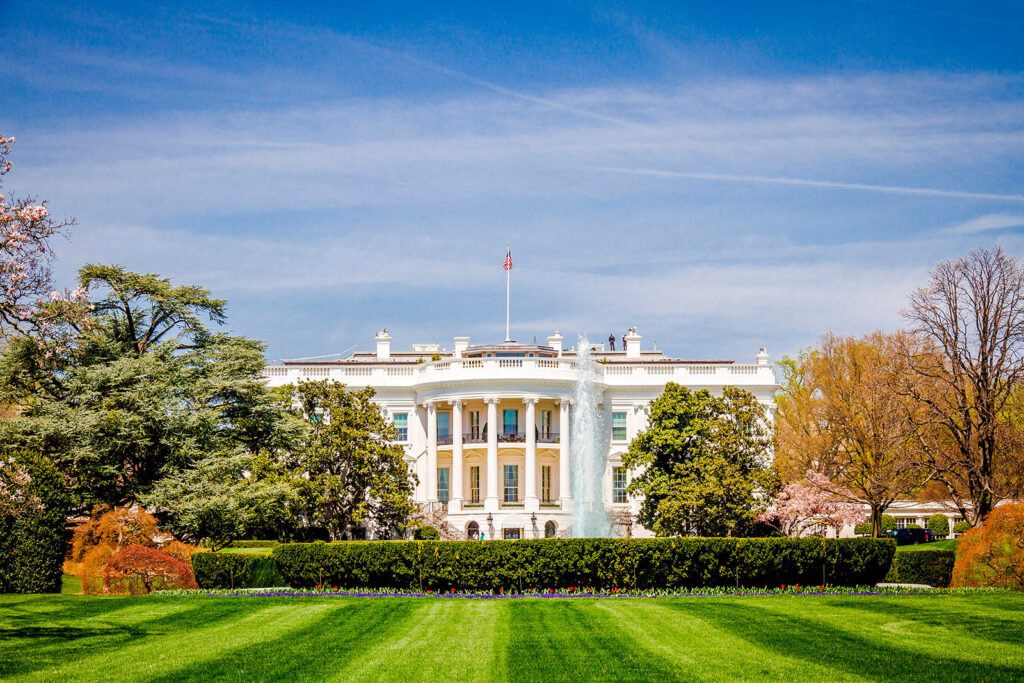
The “fundamentals” of the U.S. economy are solid, the White House asserted, invoking an ill-fated political declaration of a decade ago amid mounting concern that a recession could imperil President Donald Trump’s reelection. Exhibiting no such concern, senior adviser Kellyanne Conway declared to reporters on Monday, “The fact is, the fundamentals of our economy are very strong.” It’s a phrase with a history. Republican John McCain was accused of being out of touch when he made a similar declaration during the 2008 presidential campaign just hours before investment bank Lehman Brothers filed for bankruptcy, setting off a stock market crash and global financial decline. A case can be made for the White House position. The U.S. job market is setting records for low unemployment, and the economy has continued uninterrupted growth since Trump took office. But growth is slowing, stock markets have swung wildly in recent weeks on recession fears, and indicators in the housing and manufacturing sectors have given economists pause. A new survey Monday showed a big majority of economists expecting a downturn to hit by 2021 at the latest, according to a report from the National Association of Business Economics. Trump begs to disagree. “We’re doing tremendously well. Our consumers are rich. I gave a tremendous tax cut and they’re loaded up with money,” Trump said on Sunday. “I don’t think we’re having a recession.” Still, the Republican president took to Twitter on Monday to urge the Federal Reserve to stimulate the economy by cutting interest rates and returning to “quantitative easing” of its monetary policy, an indication of deep anxiety beneath his administration’s bravado. And he backtracked last week on taking the next step in escalating in his trade war with China, concerned that new tariffs on consumer goods could hamper the critical holiday shopping season. White House aides and campaign advisers have been monitoring the recent turbulence in the financial markets and troubling indicators at home and around the world with concern for Trump’s 2020 chances. Any administration has to walk a fine line between reflecting the realities of the global financial situation and adopting its historical role as a cheerleader for the American economy. For Trump, striking that balance may be even more difficult than for most. For decades, economic performance has proven to be a critical component of presidential job approval, and no American leader so much as Trump has tied his political fortunes to it. The celebrity businessman was elected in 2016 promising to reduce unemployment — a task at which he has succeeded — and to bring about historic GDP growth, where he has had less success. The situation today isn’t nearly as dire as in September 2008, when the U.S. and the world were heading into the Great Recession. There are no waves of home foreclosures, no spike in layoffs, no market meltdowns and no government rescues to save powerful banks and financial companies in order to contain the damage. What does exist is a heightened sense of risk about the economy’s path amid slowing global growth and the volatility caused by the trade dispute between the United States and China. There are other reasons as well for the administration’s rosy pronouncements, said Tony Fratto, a former Treasury Department spokesman in the Bush administration during the onset of the financial crisis. He said he sympathized with the Trump administration for having to choose between answering “honestly or responsibly” or otherwise about the state of the economy, noting that any hint of concern “could be self-fulfilling.” “So much of the story of the economy is how people feel about it,” said Lanhee Chen, a Hoover Institution fellow and former economic adviser to 2012 GOP nominee Mitt Romney. “And that’s an inherently a difficult thing to measure.” Highlighting a disconnect between the nation’s broad economic indicators and the “personal economies” of voters in swing states is a priority for Democratic candidates and outside groups heading into 2020. Trump’s advisers acknowledge there are few tools at his disposal to avert a slowdown or recession if one materializes: Internal concerns over a ballooning federal deficit, in part due to the president’s 2017 tax law, are stifling talk of stimulus spending, and skepticism abounds over the chances of passing anything through a polarized Congress ahead of the election. But that hasn’t stopped the White House from exploring ways to make the political cost less painful. Seeking to get ahead of a potential slowdown, Trump has been casting blame on the Federal Reserve, China and now Democrats, claiming political foes are “trying to ‘will’ the Economy to be bad for purposes of the 2020 Election.” If the Federal Reserve would reduce rates and loosen its grip on the money supply “over a fairly short period of time,” he tweeted, “our Economy would be even better, and the World Economy would be greatly and quickly enhanced – good for everyone!” Those actions he’s talking about are the sort a central bank would traditionally take to deal with or try to stave off a slowdown or full-blown recession. Strong fundamentals? A lot depends on which ones the administration highlights or ignores in public comments. Conway and other Trump aides have accurately described the rising retail sales and the solid labor market with its 3.7 percent unemployment rate as sources of strength. Yet factory output and home sales are declining, while business investment has been restricted because of uncertainties from Trump ratcheting up the China trade tension. Even if the economy avoids a recession, economists still expect growth to weaken.Federal Reserve officials estimate that the gross domestic product will slow to roughly 2 percent this year, down from 2.5 percent last year. During his presidential campaign, Trump had boasted he would achieve long-term growth of 4 percent, 5 percent or more. By Zeke Miller and Josh Boak Associated Press AP Business Writer Marcy Gordon contributed. Republished with the permission of the Associated Press.
Hope Hicks rebuffs questions on Donald Trump White House in interview
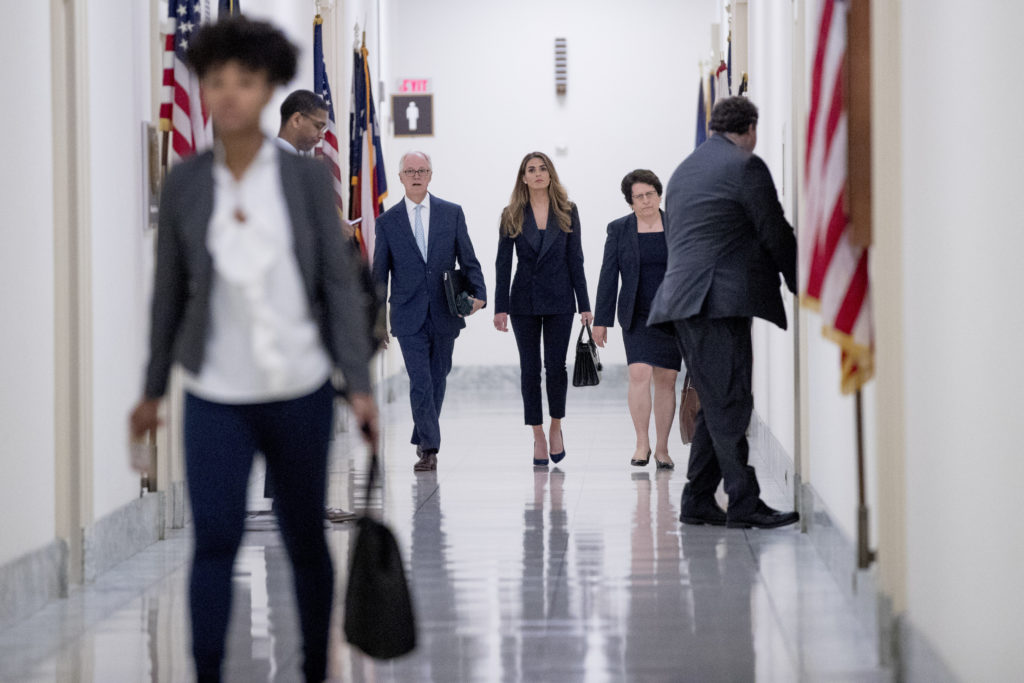
Former top White House adviser Hope Hicks refused to answer questions related to her time in the White House in a daylong interview with the House Judiciary Committee, dimming Democrats’ chances of obtaining new or substantive information about President Donald Trump in their first interview with a person linked to his inner circle. Frustrated Democrats leaving the meeting Wednesday said Hicks and her lawyer rigidly followed White House orders to stay quiet about her time there and said they would be forced to go to court to obtain answers. House Judiciary Committee Chairman Jerrold Nadler, Democrat-New York, said Hicks’ lawyers asserted the White House’s principle that as one of Trump’s close advisers she is “absolutely immune” from talking about her time there because of separation of powers between the legislative and executive branches. Nadler said that principle is “ridiculous” and Democrats intend to “destroy” it in court. Nadler said the committee plans to take the administration to court on the immunity issue, and Hicks’ interview would be part of that litigation. In a letter Tuesday to Nadler, White House counsel Pat Cipollone wrote that Trump had directed Hicks not to answer questions “relating to the time of her service as a senior adviser to the president.” The White House has similarly cited broad executive privilege with respect to many of the Democrats’ other investigative demands, using the president’s power to withhold information to protect the confidentiality of the Oval Office decision-making process. Hicks did answer some questions about her time on Trump’s campaign, the lawmakers said, but they said they learned little that was new. “She’s objecting to stuff that’s already in the public record,” California Rep. Karen Bass said on a break from the interview. Rep. Pramila Jayapal, Democrat-Washington, called her answers “a farce.” California Rep. Ted Lieu tweeted about the meeting while it was ongoing, writing that Hicks refused to answer even innocuous questions such as whether she had previously testified before Congress and where her office was located in the White House. In all, she was behind closed doors for eight hours, with an hourlong break for lunch. Democrats pressed Hicks on episodes she might have witnessed as one of Trump’s closest advisers. During questioning about the campaign, Rep. Madeleine Dean, Democrat-Pennsylvania, said she asked Hicks if she had been aware of any outreach from the Russians. After Hicks responded no, Dean named apparent contacts, such as emails, some of which are mentioned in special counsel Robert Mueller’s report. Hicks said she hadn’t thought those contacts were “relevant,” according to Dean. Republicans had a different perspective, saying she was cooperative and the interview was a waste of time, especially in light of Mueller’s two-year investigation. The top Republican on the panel, Georgia Rep. Doug Collins, said after the interview that the committee “took eight hours to find out what really most of us knew at the beginning.” Hicks was a key witness for Mueller, delivering important information to the special counsel’s office about multiple episodes involving the president. Mueller wrote in his report released in April that there was not enough evidence to establish a criminal conspiracy between Trump’s 2016 campaign and Russia, but said he could not exonerate Trump on obstruction of justice. The report examined several situations in which Trump attempted to influence or curtail Mueller’s investigation. Democrats has planned to ask Hicks about several of those episodes, including efforts to remove Mueller from the investigation, pressure on former Attorney General Jeff Sessions and the firing of FBI Director James Comey. They also planned to ask about Hicks’ knowledge of hush-money payments orchestrated by former Trump lawyer Michael Cohen to two women who claimed to have had affairs with Trump — the porn actress Stormy Daniels and model Karen McDougal. Trump has denied the allegations. Cohen is now serving three years in prison partly for campaign violations related to the payments. One lawmaker who was in the room said Hicks would not answer many of those questions. The person requested anonymity to discuss the closed-door interview. As Hicks spoke to the committee, Trump tweeted throughout the day. He said the interview was “extreme Presidential Harassment,” and wrote that Democrats “are very unhappy with the Mueller Report, so after almost 3 years, they want a Redo, or Do Over.” He also tweeted that it was “so sad that the Democrats are putting wonderful Hope Hicks through hell.” Trump has broadly stonewalled House Democrats’ investigations and said he will fight “all of the subpoenas.” House Speaker Nancy Pelosi is taking a methodical approach to investigating Trump. More than 60 lawmakers in her caucus — including around a dozen on the Judiciary Committee — have called for opening an impeachment inquiry, but she has said she wants committees to investigate first and come to a decision on impeachment later. While Trump has continued to block their requests, Democrats have recently made some minor gains, such as the Justice Department’s agreement to make some underlying evidence from Mueller’s report available to committee members. The Judiciary panel wanted a higher-profile interview with Hicks, subpoenaing her for public testimony. But they agreed to the private interview after negotiations. A transcript of the session will be released in the coming days. The committee has also subpoenaed Hicks for documents, but she has only partially complied. She agreed to provide some information from her work on Trump’s campaign, but none from her time at the White House because of the administration’s objections. Also Wednesday, House Intelligence Committee Chairman Adam Schiff said Russia-born business executive Felix Sater will talk to House intelligence committee staff behind closed doors as part of its investigation into Russian election interference. Schiff wouldn’t give a date for the interview, but another person familiar with the meeting said it will happen Friday. The person requested anonymity to discuss the private interview. Sater worked with Cohen on a Trump Tower deal in Moscow before the 2016 election. The project was later abandoned. Schiff said the committee will also talk to

